Enjoy DatePsychology? Consider subscribing at Patreon to support the project.
What kind of man is desirable to conservative women and what kind of man is desirable to feminists? You might expect them to be radically different. If people select partners who are congruent with their values, conservative women may prefer men who follow a more masculine role while feminist women may prefer men who follow a more egalitarian role. However, some research has also found that even feminist women prefer men who follow traditionally masculine scripts (see my review at Aporia: Rethinking Benevolent Sexism).
I ran a short survey to try and answer some of these questions. Let’s dig into it.
Methodology & Vignettes
I designed six vignettes and asked participants to rate them for desirability in long term relationships, casual sex, and as friends. The first two vignettes are based on the Ambivalent Sexism Inventory (ASI). The descriptions of the men are very close renditions (almost word-for-word) of the hostile sexism and benevolent sexism subscales. As both hostile and benevolent sexism may be associated with attitudes perceived as antifeminist, I described both men as active feminists in order to offset perceived other-group identification. This is an attempt to isolate the attractiveness of benevolently sexist and hostile sexist attitudes.
The second and third vignettes describe a man who endorses traditional stereotyped masculine behavior and gender roles and a man who endorses non-masculine behavior and egalitarian gender roles.
The fifth and sixth vignettes describe a man who endorses common beliefs within the manosphere and a man who represents a “neutral normie” — someone with attitudes typical to the average man. Below are each vignette. Let’s meet our contestants:
Hostile Sexism Male Feminist
Man 1 considers himself to be a feminist and occasionally participates in feminist spaces. He believes that men and women should be equal, but he is concerned that women seek too many special favors in the workplace and social environment. He does not believe that women should be afforded special privileges, such as in workplace hiring or being rescued first in disaster scenarios. He is concerned that some feminists seek to have more power over men and that society is unfair to men.
Benevolent Sexism Male Feminist
Man 2 considers himself to be a feminist and occasionally participates in feminist spaces. He also believes that women should be cherished by men and that women are generally more pure. At the end of the day, he believes that all men should have a woman who they adore in their lives and that no man is complete without a woman who he loves.
High Endorsement of Masculine Stereotypes
Man 3 believes that men should strive to develop the best physical appearance that they can. He also believes that men and women should maintain a polarity within romantic relationships that reflect what he sees as complementary roles. When going out on dates, Man 3 prefers to pick up the check, pull out chairs, and hold the door. Although not essential, Man 3 would ideally like to have a relationship where he maintains the household on his income while his wife can stay home.
Low Endorsement of Masculine Stereotypes
Man 4 believes that society imposes unrealistic expectations for the male physique. He believes strongly in egalitarianism within a relationship and believes that men and women should have equal roles. When going out on dates, Man 4 prefers to split the check. Although not essential, Man 4 would prefer to have a relationship where both partners work and contribute financially in an equal way to the household.
Manosphere Talking Point Vignette
Man 5 believes feminism is a destructive and hostile force towards men. He believes that society is characterized by a “gynocracy” that works against the interests of men. To Man 5, feminists seek to have power over men and restructure society to give unfair benefits to women. He believes that women often overreact to offenses and exaggerate their problems. Man 5 would prefer not to work with women and often has negative feelings towards them.
The Neutral Normie
Man 6 rarely thinks about feminism at all. He does not consider himself a feminist and would say he is neutral on the topic if asked. In private he might say he secretly thinks feminism is a little silly, but harmless. He believes that society is mostly fair for men and women and that both genders can excel in any career that they work hard at. Man 6 shows no preference for working with men or women and has no negative feelings towards women.
Results
Descriptive Statistics
A total of 460 participants (225 women) with a mean age of 30.7 for women (SD 9.07) and 32.9 for men (SD 11.64). Approximately half of both men and women reported being in a committed relationship. 31.9% of men reported they were feminist and 76.3% of women reported they were feminist. To compare, a recent representative Pew poll of Americans found 61% of women reported that feminism “described them well” (Pew, 2020).
I asked participants what type of feminism they identified with. Participants were able to select more than one. Over 30% of participants selected one of the two highest categories, intersectional feminism and radical feminism.
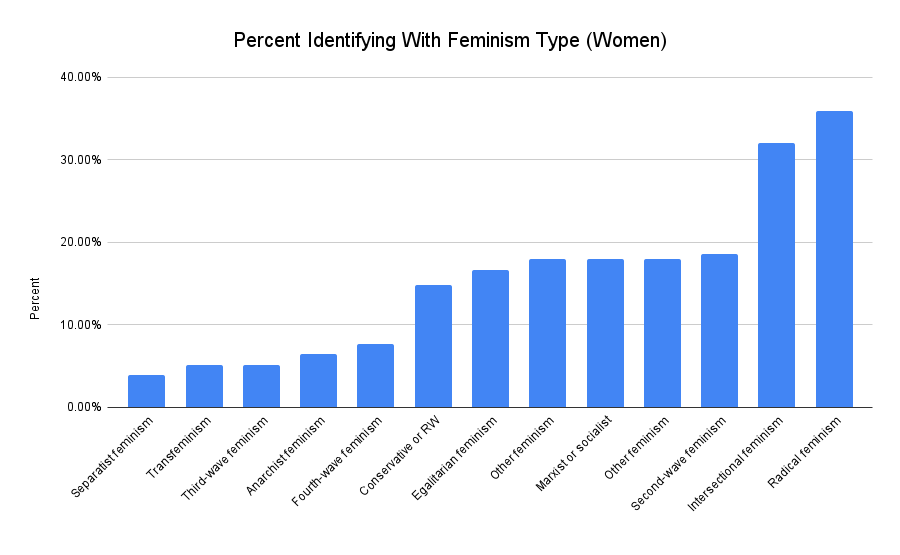
In a 1-7 Likert measure of political ideology from left to right, both men and women in the sample were slightly left-wing. The mean score was 3.4 for women and 3.8 for men.
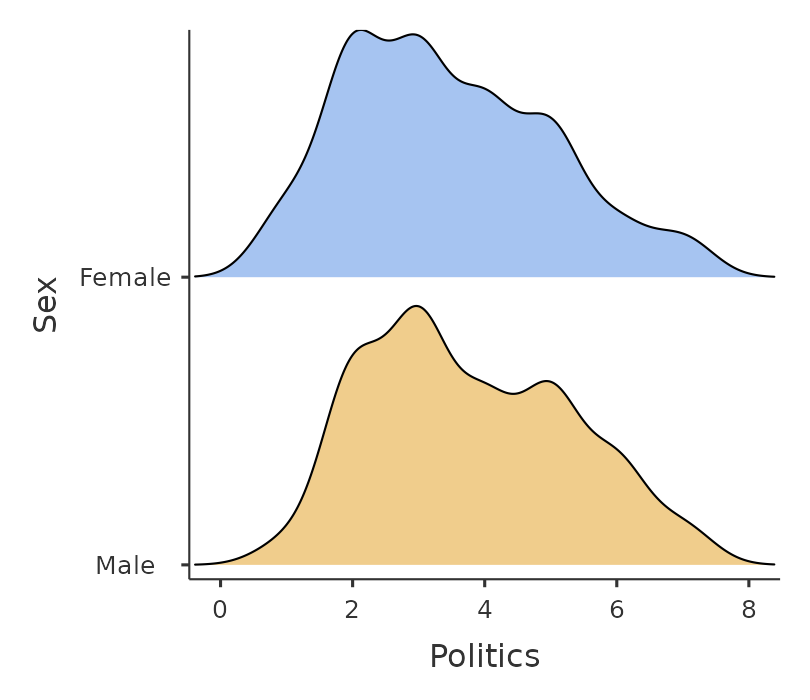
Vignette Results
Women rated men on a 1-7 Likert scale for desirability across three variables: a long term relationship, casual sex, and as a friend. Below are the results for women:
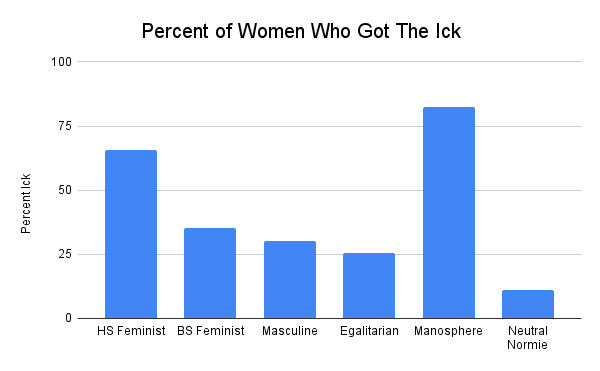
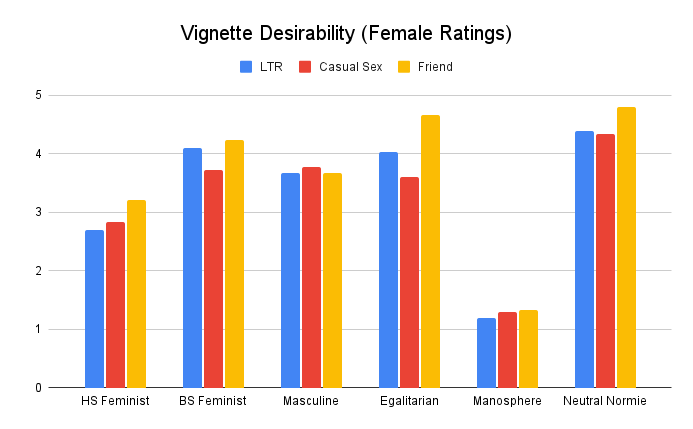
I have written in the past about how mate selection may look more like a binary decision than a Likert scale (see: Facial Attractiveness: Less Important For Male Dateability). We can see this in the phenomenon of “the ick.” This is an immediate and strong revulsion that women feel toward a man. Essentially, the ick is an instant no. It’s an impression or behavior that results in a rapid loss of attraction. An immediate deal-breaker.
Here you can really see a difference: the neutral normie did the best, while the hostile sexist and manosphere vignettes generated the most ick.
Conservative Women
The percentage of women who participated in my sample skewed slightly left and feminist. This is also true of women in the general population. You may wonder if conservative women are different. The following statistics are for women who only responded as a 5 or more on political ideology. This is the right-wing subsample of women.
Of these women, 23.7% said they were feminist and 37.3% said maybe or unsure. Below are the ick percentages and ratings of desirability:
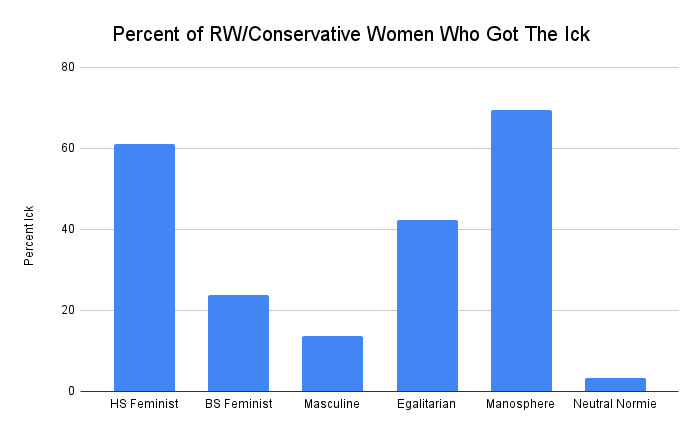
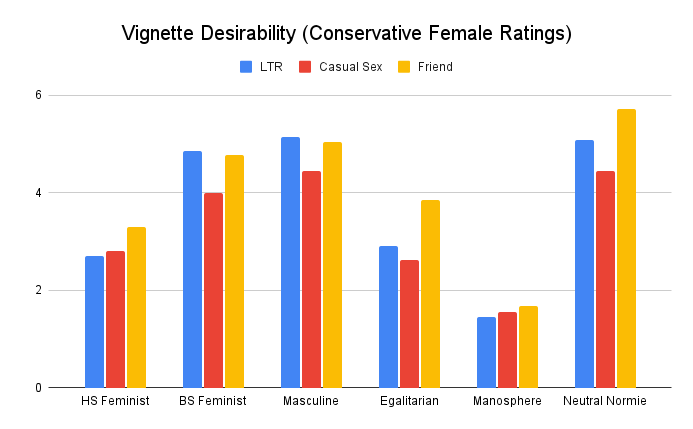
Here we see a similar pattern. The hostile sexist and the manosphere vignettes did the worst. The egalitarian vignette did poorly as well. The masculine and the neutral normie vignettes did the best. The benevolent sexist vignette had a relatively low ick response for conservative women, even despite describing a man who identified as a feminist and was active in feminist spaces.
The benevolent sexism, masculine, and neutral normie vignettes were also rated the most desirable on the scale. Although the benevolent sexist vignette was described as a feminist, it doesn’t look like it was penalized by conservative women. The benevolently sexist feminist was as desirable as the masculine vignette.
Feminist Women Only
What about feminist women? Here are the charts:
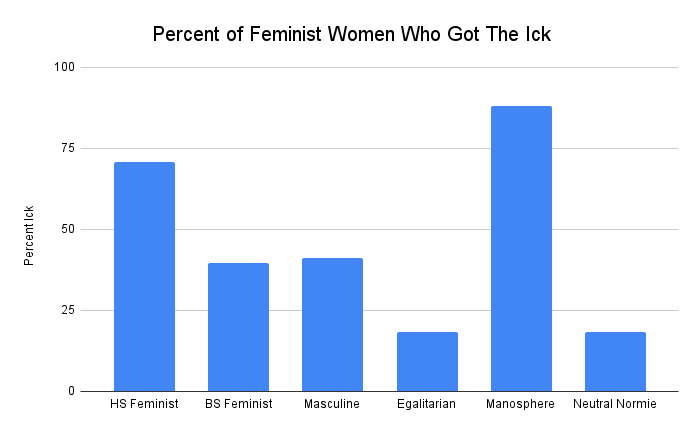
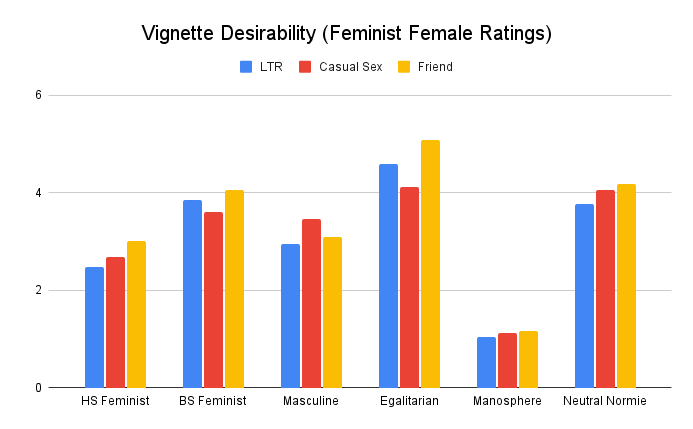
We do see a few differences, but the pattern remains the same. Feminists reported a higher percentage of “icks” for all of the vignettes. The manosphere vignette remained the least desirable.
There is an interesting reversal here, however. While conservative women preferred the traditionally masculine vignette, women who identified as feminist preferred the egalitarian vignette in comparison. In my data these are not discrete groups (some conservative women were also feminists), so this may be driven by the larger number of left-leaning feminist women who responded in the feminist condition.
Little evidence for differences in short vs long term mate preferences
A great deal of past research on dating preferences has looked at long versus short term mating. In other words, relationships versus casual sex. It has been somewhat consistent within the literature that more masculine men are preferred in short term contexts.
The problem is that when people hear “masculine men are preferred in short term contexts” they never ask “by how much.” We’re used to reading headlines and abstracts that tell us something is “statistically significant” without looking at effect sizes.
Up to this point, I have only reported descriptive statistics with no statistical tests. I would like you to look at the charts and compare the bars for short and long term mating desirability. They are quite close. It looks like what is desired in long term mating is also desired in short term mating. The differences are small.
Are some of the differences statistically significant? Maybe, maybe not. But are they practically or clinically significant? In other words, is the difference large enough that it is meaningful? A statistical test can’t tell you that; this is an interpretation you must make by looking at the practical effect size.
Here are results of a Kruskal-Wallis test comparing all of the groups with Bonferroni correction for multiple comparisons:
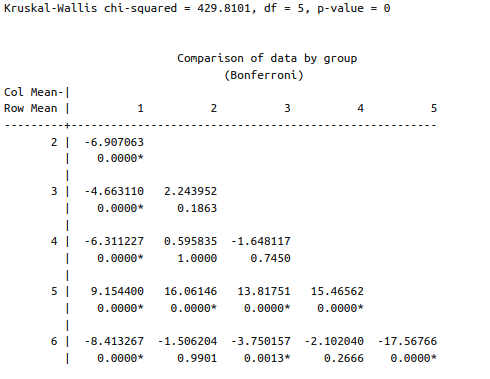
The hostile sexist vignette was significantly different from all vignettes and the manosphere vignette was significantly different from all vignettes. The masculine and benevolently sexist vignettes were not significantly different from one another.
The correlation coefficients for short term and long term mating across all six vignettes ranged from .52 to .75 (all p’s < 2.2e-16). In other words, men described in the vignettes who were found desirable for a committed relationship were also found desirable for casual sex.
I compared long term and casual sex desirability across each vignette. Vignette 2 (benevolently sexist vignette) and 4 (egalitarian) were statistically different at p = 0.03026 and p = 0.01692. Correcting this for six comparisons, it would not be below the required p of 0.008 and would not be significant.
How did men see these vignettes
Men were asked to indicate how desirable these vignettes would be to women. How well do male perceptions match female perceptions?

Men seem to have underestimated the ick of the hostile sexist. Male ratings for the benevolent sexist and traditionally masculine vignette were closer to the ratings given by feminist women than by conservative women. However, they gave an ick estimate similar to conservative women for the neutral normie.
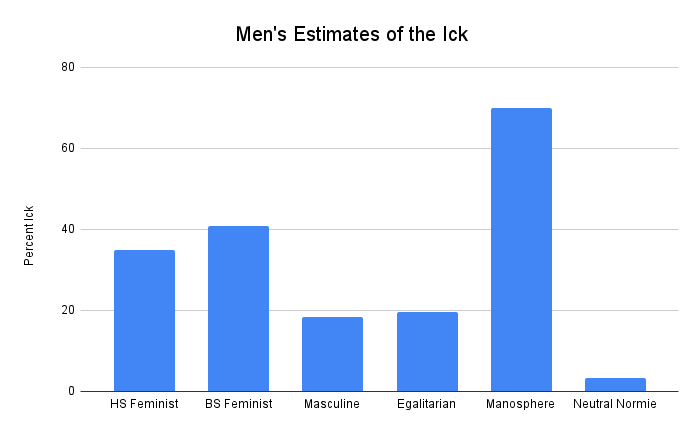
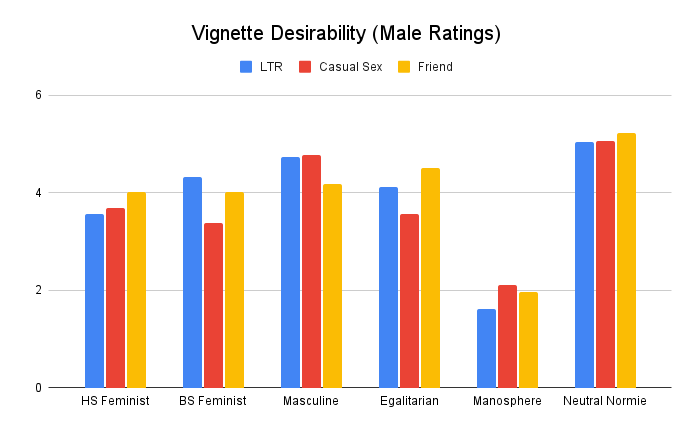
Likert ratings given by men follow a similar pattern. They overrated the desirability of the hostile sexist vignette. They also gave scores for the manosphere vignette that were about twice as high as those given by both conservative and feminist women (although they still correctly predicted it would be the least desirable vignette).
Discussion
The hostile sexist and manosphere vignettes did poorly with women overall. These two vignettes did poorly with both feminist and conservative women. The neutral normie vignette did the best (despite being arguably sexist itself; it was a man described as thinking that feminism was silly and that society was already fair). Women who were conservative preferred the masculine stereotyped vignette with traditional gender roles while women who were feminist preferred the egalitarian stereotyped vignette.
Additionally, for feminists, the benevolently sexist feminist did as well as the egalitarian. For conservative women, the benevolently sexist feminist did as well as the masculine stereotyped vignette.
Feminist identification didn’t seem to offset hostile sexism. Bad news for the so-called “sneaky fuckers,” as biologist John Maynard Smith dubbed them, or subordinate males in a group who use alternative strategies to access women. Feminist identification also didn’t make vignettes less desirable to conservative women, which is perhaps the most surprising result. Conservative women rated the benevolently sexist feminist a little higher than feminists did both in long term and casual sex contexts. Conservative women didn’t rate the hostile sexist man higher than feminists did, either.
Perhaps the chivalrous behavior (basically what benevolent sexism is) offset the ideological identification? Almost twice as many conservative women said the egalitarian vignette gave them the “ick” compared with the benevolently sexist feminist.
Men did relatively well at predicting what women would desire or not. I didn’t run statistical tests on this, but glancing at the descriptives all that stands out is men underestimated the undesirability of the hostile sexist and manosphere vignettes.
There was not much difference in short and long term mating preferences by vignette. A caricature has filtered into popular discourse around short and long term mating preferences. In essence, it’s the perception that men desired in short and long term mating are fundamentally different. This was never the case. There are differences that can tip the scale. For example, behavioral dominance, extraversion, and high physical attractiveness may give someone an edge in seeking casual sex. But, more often than not, what is desirable in a short term relationship is also desirable in a long term context.
Finally, we can speculate on why the hostile sexist and the manosphere vignettes did so poorly. A socially desirable response isn’t a good explanation, nor is self-deception. Both feminists and conservatives rated highly the vignette of a man who thought feminism was silly. In fact, that was the vignette that generated the least ick. Conservative women also rated the feminist vignette highly that described benevolently sexist behavior. The simple explanation is that both hostile sexism and the manosphere vignette expressed animosity and dislike toward women. Hating the opposite sex will not make you attractive to them. This should be pretty obvious, it probably doesn’t need to be explained in depth, and is truly one of those “did we need a study for that” results.
References
Pew (2020). “61% of U.S. women say ‘feminist’ describes them well; many see feminism as empowering, polarizing.”
10 comments
The issue is that such vignettes are rarely symbolic of the actual information women have when making a judgment about a potential partner.
I and other “manosphere” dudes I know don’t make these beliefs public to partners and potential partners. We discuss our beliefs in private around likeminded men. We’re all successful with women and women we date wouldn’t guess that we have these beliefs.
Exactly my thoughts as well. The vignettes are caricature that are so separated from reality. A man’s political views have nothing to do with his romantic success especially when they are to be distilled into a “meme” of course any one isn’t going to like someone with an openly negative and hostile view of them , even if it’s true lol
Now you are all succesful with women? So incels don’t exist? Resentful MGTOWs who were cheated on don’t exist? Wow
The three other dudes you know, who pretend to be nice guys and are too coward to speak with their chest to their partners, can exist, but that doesn’t mean they represent the majority of manosphere males.
I haven’t met any redpilled or blackpilled guy who is really succesful with women, they are all resentful cucks or autistic fakecels.
@chio You’ve never meet any red pilled or black pilled guy who get girls’ because the only ones who talk about it like you, are terminally online creeps.
Men who find the “manosphere” are probably doing so because they are already unsuccessful or having difficulty in dating. Not to mention the total domination of the algorithm on day to day life now regardless of how your personal life is going.
Coach’s coach players play. The writer of this post is banking on the manosphere consuming his content. Good looking guy too 😉 Will def get traction for the grift, more power to him. He has good content too, but like you he is a part of the “manosphere”
The article states the obviousness of the experiment in the last sentence. Men who are openly hostile to women in a caricature like meme presentation are obviously going to be rejected by women. You can extrapolate that this would happen with any two demographic’s you can think of.
The problem is women and people in general have zero ability to discern a mans level of “misogyny” or hostility against women in such an easy and efficient way that directly correlates to the real world . If they did, abused women would be a thing of the past and we could close down women’s shelters. Family’s and women would be thriving . Equality and equity achieved.
Incels and resentful men have always existed for all of human history. Before a niche internet community like the “manosphere” existed, unwanted single men have always existed, ugly men have always existed, socially inept men have always existed, poor men have always existed, violent men have always existed, unhealthy men have always existed . Stop acting like the “Redpill” or the “manosphere” is the reason these men are undesirable or at best having a tough time.
Extremely interesting stuff Alexander. But something that has always bothered me in dating is the following “how can I differentiate something that I should change about myself versus something that I shouldn’t/don’t have to”. If I like a certain weird form of humour, is it too weird or just weird and “not for everyone”? Could you do a similar survey as you just did but then take this into account?
The fact your even reading this probably means your fucked tbh
From the “hostile sexism” vignette:
“He does not believe that women should be afforded special privileges, such as in workplace hiring or being rescued first in disaster scenarios.”
Believing that people should be treated equally regardless of gender represents “hostile sexism”?
Yes! looks like hypocrite and this is a (maybe unconscious) bias from researcher who still hope favor for women. So validity this research is still questionable.
Btw how the researcher/s control sexual orientation variable? Did they make sure all men an women samples are heterosexual or they have theory that sexual orientation doesn’s have impact?
The responses in these papers is a reflection of what women think other women within their in group will judge them for. That is all.